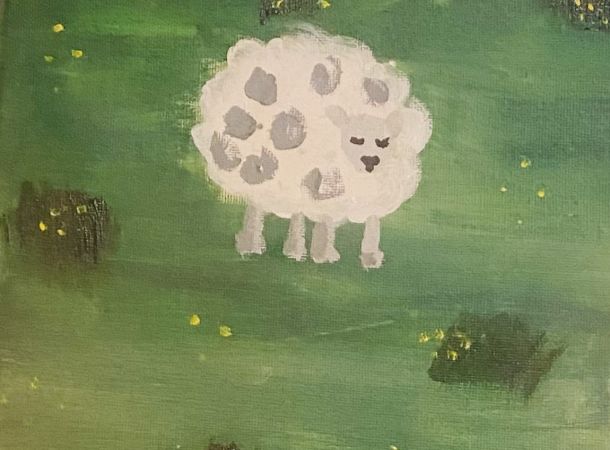Devils and Demons and Darkness, Oh My!
Let’s try to wrestle with the topic of demons, even if it is a touchy subject. One of the main BLB (Blue Letter Bible) definitions of daimonian, usually translated as demon or devil, is an idol or god of the nations. Let’s take this and other verses from the Scriptures and attempt to form an understanding.
God created humans with the beautiful purpose of being vessels of the Divine Presence, but it does not look like God asked us to create (bara in Hebrew). Instead, He invited us into a partnership in ruling over creation with Him. In the end, we decided we would rather be gods and created idols, called the works of men’s hands. We formed them, worshipped them, and became like them.
Psalm 96:5: For all the gods of the peoples are idols, but the Lord made the heavens.
Psalm 115:4-8: Their idols are silver and gold, the work of men’s hands. They have mouths, but they do not speak; eyes they have, but they do not see; they have ears, but they do not hear, noses they have, but they do not smell; they have hands, but they do not handle; feet they have, but they do not walk; nor do they mutter through their throat. Those who make them are like them; so is everyone who trusts in them.
Did you get that? Those who make and trust in idols are like them-mute, blind, and deaf. Interestingly enough, some of the “demon-possessed” humans in the gospels are blind and mute.
Mark 3:22-27, Luke 11:14-23, and Matthew 12:22 state: Then one was brought to Him who was demon-possessed, blind and mute; and He healed him so that the blind and mute man both spoke and saw.
In the same way, when we worship God, we become like Him (1 Cor 6.17). We choose what image we reflect by what we worship. Here is a list of the names of idols based on the work of Rabbi Reuven Chaim Klein on his website, ohr.edu.com.
Elilim– “empty”-according to Rashi, this is because those who talk to the dead are empty and hollow themselves. The Hebrew Scriptures define necromancers as empty water skins. Yeshua tells us that when His Light or Spirit comes in and cleanses us from darkness, we should not stay empty vessels but rather fill ourselves with Tabernacle decorations. These decorations include prayer (incense), hope (shewbread), praise, repentance, and gratitude (altar), along with commandments pursued with anointing (menorah fueled with olive oil), to name a few internal decorations. We do not want to be empty vessels, or darkness will fill us (Mt 12.43-45).
Masecha– root word means “poured,” as in poured by humans into molten images. This word could also refer to “sichah,” translated as anointing because the men who created them consecrated them unto the deity or god they wanted to inhabit the idol. Humans did not consecrate idols for the Divine breath, so the only things outside of that Holy Spirit are darkness and chaos. I wonder if the little child who was “demon-possessed” would cast himself into fire and water because that is how molten images are made (Mt 17:15). You pour metal into a mold, put it in fire, and then dunk it in water. Could this narrative be speaking of a child being consecrated to an idol and manifesting the results of that?
Nitzavim– “standing,” which refers to the fact that idols can only stand if a human stands them up.
Atzarim– means “bones” and according to Malbim, they sadden (atzuv) those who worship them with their failure to meet needs. I wonder if they are bones because they are lifeless. The demon-possessed man in Mark 5, the story that gets the most attention, lived amongst bones in a graveyard, naked and uninhed, before Yeshua healed him. Those who trust in false gods are lifeless like a pile of bones because only God can give life to bones.
Gilulim– “disgusting” like poo (glalim). Malbim says this is because when humans create idols, they make them in disgusting images, like gargoyles or scary animals. People who exhibit dark or demonic attributes can start looking a little feral. Their external starts to mirror the internal.
Shikatzim– means “abomination” due to the root sheketz. Idols are an abomination to God.
Chamanim– translated as “in the sun,” which some believe refers to the way they die, out in the open like animals, who are also made from earthly elements.
Ashram– meaning “receives validation (ishur) from outside forces.” Just like the moon, which receives its light from the sun, idols receive life from those who create and worship them. Paul says that idols are nothing on their own. They receive value and life from those who partner with them (1 Cor 10.19).
Israel wandered through the wilderness of Sin for forty years (Ex 16.1). While on this journey, God reminds them around 118 times, “Do not worship idols, only worship Me.” Idolatry is a pervasive theme in the Scriptures. Being demon-possessed means you have failed to worship and obey God, which creates an internal disorder, darkness, blindness, muteness, and deafness that only the Light of Yeshua can cast out or replace.
One of the definitions of “cast out” that makes so much sense to me is a “force overcoming an opposing force.” Yeshua’s Spirit overcomes any opposing force. When demons tremble, I imagine this refers to humans who have become one with the idols and false gods they have placed their trust in. They tremble at the name of Yeshua because He is that force to reckon with. When the demon-possessed people say, “Have you come to punish us before our time?” They are most likely referring to the punishment God declared on the gods and idols of the nations.
Jeremiah 46:25: The Lord of hosts, the God of Israel, says: “Behold, I will bring punishment on Amon (a sun god) and No (Ancient Thebes) and Pharaoh and Egypt, with their gods and their kings-Pharaoh and those who trust in him.
How does God bring judgment on other gods if they are lifeless and worthless? I think by bringing judgment on those who trust in them. These are a few opposing forces in the Scriptures- fear vs. love, chaos vs. order, light vs. dark, and sin vs. righteousness. Fear is connected to torment because the fearful one awaits punishment according to 1 John 4:18. The humans connected to demonic behavior seem tormented, aware of an impending doom (Lk 8.26-39). Whenever Yeshua came face to face with someone in torment, He made them whole because He is that perfect love that casts out fear, the Light that replaces darkness, and the righteousness of God that brings order. Until He renews all things, darkness, and evil will be a part of this world because it comes from men’s hearts (Mt 15.19), but we do not have to live in fear of these elements if we worship and obey the Holy One. What some call “spiritual warfare,” is simply to trust, pray and obey. The end.




Leave a Reply